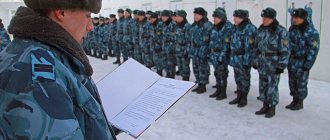Convicts who have committed crimes of minor or moderate gravity, usually through negligence, are sent to colony settlements. This type of correctional facility was created to protect such convicts from the influence of criminal culture and marginal values that surround prisoners in higher security colonies. In settlement colonies, soft restrictions apply, and convicts have the opportunity to work and study in conditions close to free conditions.
A completely law-abiding citizen who committed a crime without malicious intent can end up in a colony-settlement: for example, a driver who carelessly hit a pedestrian. You will learn how to act in this case and what to expect in this article.
What to do after the trial?
According to Art. 75.1 of the Penal Code of the Russian Federation, the convicted person gets to the colony-settlement on his own if the court has not issued an arrest order.
The territorial body of the penal system (FSIN), within 10 days from the date of receipt of a copy of the court verdict, is obliged:
- Determine the place where the sentence will be served and issue an appropriate order.
- Determine the time during which the convicted person must arrive at the colony.
- Allocate money for travel and food (can be replaced with cash payments).
- Compile a file of the convicted person, which includes his personal data, fingerprints, photograph and reference certificate.
In this case, convicts are usually sent to colony settlements in the same region where they lived or were convicted. However, this rule may be broken under special circumstances :
- Based on the health status of the convict.
- Or to ensure the personal safety of the convicted person.
- Or with the consent of the convicted person.
- If it is impossible to place the convicted person in a local colony.
The time taken to the colony is counted towards the term of imprisonment, for which it is recommended to keep your travel documents.
If the convicted person does not arrive at the place of serving his sentence within the prescribed period, he is put on the wanted list and, after detention, is sent to a colony under escort.
When the place where the sentence will be served becomes known, it is recommended to search for information about this colony on the Internet: location and transport, working and living conditions, reviews about the colony on forums. You can also contact those who live or work there on social networks (Despite the ban on the use of the Internet in correctional institutions of the Russian Federation, many convicts find ways to circumvent this ban).
How is it different from a general regime institution?
It is believed that a colony-settlement is an institution where there are restrictions on freedom, but they are rather conditional.
There are some peculiarities.
- Prisoners are not locked in separate cells from each other.
- Free movement around the territory if necessary.
- Leaving the site upon receipt of permission.
There are no restrictions associated with the transfer of parcels and funds, or their practical use.
The contingent of criminals held inside is another difference between settlements and institutions belonging to the general regime . In Russia, women's and men's prisons can now be opened equally. Free settlements include dormitories, on the territory of which representatives of both sexes can be present. Those who have committed an offense for the first time with moderate or light consequences are placed in such conditions of detention. The same applies to those who broke the law through negligence, without malicious intent.
The high value of labor is another indicator that serves as a distinction. The measure of the degree of correction of a convicted person is the performance of certain types of work. If duties are performed conscientiously, it means that a person is able to establish self-discipline and adapt to life in society. You can get parole if your attitude towards this process is correct.
What can you take with you?
Packing for a colony-settlement is similar to packing for a student dormitory, but with some restrictions. The full list of prohibited items can be found in the document: “List of things and items, food products that convicts are prohibited from making, having on them, receiving in parcels, transfers, parcels, or purchasing.”
Brief list of prohibited items:
- Mobile phones, SIM cards, laptops, cameras.
- Alcohol and alcohol-containing liquids (including perfume and cologne).
- Narcotic substances and smoking mixtures.
- Medicines without medical indications.
- Knives and piercing objects.
- Straight razors and blades.
- Axes, hammers and other tools.
- Playing cards.
- Topographic materials, maps and compasses.
- Lighters.
What to take with you:
- Regular clothes, preferably not too bright.
- Several pairs of underwear and socks, regular and warm.
- Handkerchiefs.
- Slippers.
- Towel.
- Sports suit.
- Personal hygiene items: soap, toothbrush, shampoo.
- Bed sheets.
- Plastic dishes (reusable).
- Notebook and pen.
- Boiler, electric razor.
- A small supply of food.
- Watch.
- Books (not everyone can skip them, it’s better to take classic literature).
- Cigarettes, and better yet, more. Even if you don’t smoke yourself, take it anyway: you’ll exchange it for something useful.
- And don't forget matches (lighters are prohibited).
- Lots of black loose leaf tea (similar to cigarettes).
- Money in the required amount. There are no volume restrictions, but it is better not to take large amounts. Limit yourself to five thousand. Subsequently, it will still be possible to receive money transfers from relatives.
It is recommended to put things in a simple canvas bag, as the suitcase may not be missed. There is no need to take a large amount of things with you: a lot can be bought in a store on the territory of the colony or in a nearby village, or received as a gift from relatives.
It is recommended to check with the colony administration in advance about prohibited, permitted and necessary items.
Terms of serving the sentence here
The following conditions apply in the settlement colony:
- The prisoners are not monitored by guards: all prisoners can move freely around the territory of the institution. They are also allowed to visit neighboring settlements, if there are any, and if there is an agreement between the colony and the village.
- There are no restrictions on receiving parcels: however, there is an exception - you cannot bring parcels into the territory of the colony that may contain items that provoke an antisocial lifestyle.
- The uniform is civilian: therefore, to the question: what to take with you to a colony settlement, the answer is simple: the usual style. It is believed that in this way those serving their sentences do not stand out from others, which helps them adapt more easily.
- Colonies are divided into genders: male, female, children.
- The administration can conduct a search at any time: if items that fall into the category of prohibited items are found, sanctions will be applied to the violator, up to and including transfer to a correctional colony.
- Regardless of the financial situation of the convicted person, he must work - it is work that must develop useful habits. All work is carried out in accordance with labor laws.
- In their free time from work, convicts can learn new professions - for this purpose there are educational institutions on the territory of the colony.
You can even live in a colony-settlement with your family. This is possible if the person has proven himself positively. Then he can live with his family in rented premises.
In such a situation, he will have to go to the colony at least 4 times a month and check in.
It is worth considering separately the question: is it possible to use a mobile phone? The answer is quite simple. Despite this freedom, prisoners are not allowed to use communication devices.
After arrival
Every person arriving in the colony is convicted:
- Goes through a thorough search and examination of things.
- Gives over the passport and other identification documents, instead receives a certificate of the established form.
- Undergoing a medical examination.
- Placed in quarantine for 10-15 days.
During a search, some personal belongings may be seized, in accordance with the subjective opinion of the searcher and regardless of what is written in the laws. You should request a receipt for receipt of the seized items at the storage warehouse, indicating their value. Subsequently, things can be passed on to relatives, or perhaps it will be possible to get something back for use.
During their stay in quarantine, convicts can be given various offers: accommodation in a “VIP hut” or a good job for some pay. Such services exist in some colonies, but you should not agree to any deals until you understand who you can conclude them with and who is just a scammer.
In many colonies, convicts are forced to “sign the 106th”: an agreement for free work on landscaping. By law, the administration does not have the right to force this, but it is often difficult to refuse.
After quarantine, convicts move into dormitories, which usually house several people per room. The rooms have all the necessary furniture, and may also have a refrigerator, kettle, stove, TV, depending on the administration’s policy. We talked in more detail about how convicts live in a colony-settlement here.
If things are seized
Upon arrival at the colony-settlement, convicts are searched, their belongings are weighed and inspected. If something prohibited is found (see the list above), it will be confiscated and sent to a warehouse for storage, or destroyed - the decision on this is made by the head of the colony. In this case, an act is drawn up, with which the owner must be familiarized with signature.
The settler's property should not weigh more than 50 kilograms. If an advantage is discovered, the prisoner will be given a choice of what of his “wealth” to keep with him and what to send to the warehouse.
How to behave?
Procedures in different colonies may differ significantly, but general principles should be observed everywhere:
- At first, talk less and listen more, keep conclusions and value judgments to yourself.
- Do not talk about your personal and sexual life.
- Do not take on obligations without understanding their essence and price. In the case of valuable gifts, give something equivalent in return.
- Do not enter into conflicts, especially with representatives of the colony administration or with representatives of the “thieves’” authorities.
If a conflict arises with convicts, which may threaten health and life, you can contact the administration. In this case, the convicted person will be transferred to solitary confinement to ensure his safety.
Such a step, as a rule, is viewed negatively by other inhabitants of the colony, so it is better to try to resolve the conflict yourself. Otherwise, after being transferred to solitary confinement, the convicted person finds himself in social isolation for a long time, and returning to a normal environment is difficult until the very end of his sentence.
On our website you will find other useful materials telling about the rules and conditions of serving sentences in various correctional institutions. From them you can find out:
- What are the features of children's colonies for minors?
- How are sentences served in women's prisons?
- What you need to know about a general security prison?
- How does a maximum security colony differ from a general prison colony and others?
Types of Colonies
There are two types of such penitentiary institutions:
- Gentle regime - those convicted who committed a crime through negligence, in a state of passion, and so on are sent there. Also, those who have committed a crime intentionally, but not more than average gravity, can be sent here.
- Settlements that are intended for prisoners serving a sentence for a moderate or serious offense, but who have earned such “mitigation” by their diligent behavior.
However, it should be noted that such divisions are conditional, and therefore exceptions are quite possible.
Have a question for a lawyer? Ask now, call and get a free consultation from leading lawyers in your city. We will answer your questions quickly and try to help with your specific case.
Telephone in Moscow and the Moscow region: +7
Phone in St. Petersburg and Leningrad region: +7
Free hotline throughout Russia: 8 (800) 301-39-20








